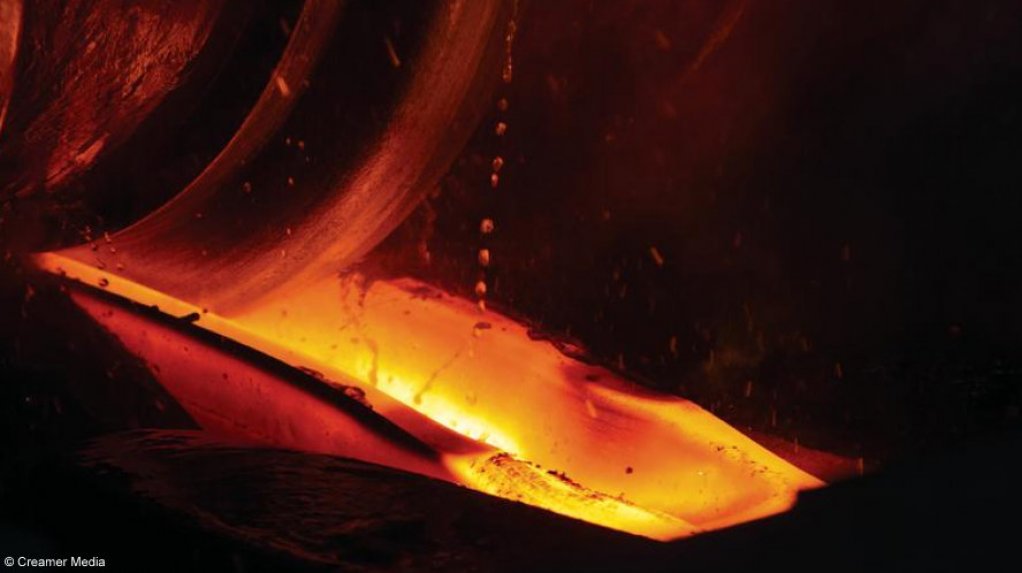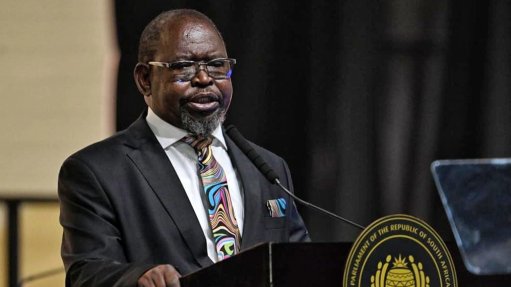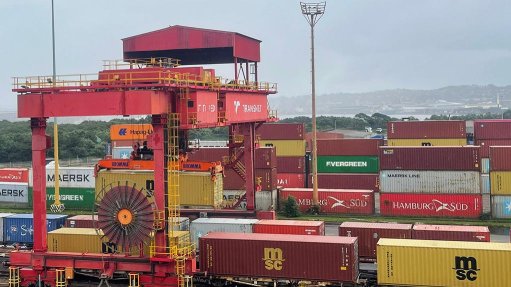Simmering steel tensions coming to boil as Newcastle mill’s survival comes under spotlight again
Long simmering tensions in South Africa’s steel sector appear to be coming to a boil following a joint statement by the National Union of Metalworkers of South Africa (Numsa) and ArcelorMittal South Africa (AMSA).
In it, the trade union and the steel producer confirmed that Numsa would step back from a planned strike against retrenchments at the company, triggered by the closure of coke batteries 6 and 7 at Vanderbijlpark.
However, Numsa general-secretary Irvin Jim also used the statement to call for urgent government interventions aimed at stemming yet further job losses and deindustrialisation in the sector, including by preventing the possible closure of AMSA’s Newcastle mill.
Having been briefed by AMSA CEO Kobus Verster on the “dire situation facing the business”, Jim concluded that the JSE-listed company had been left with “no option but to restructure its operations”.
Jim expressed deep concern about the potential closure of the Newcastle plant, which he said would place 3 500 jobs at risk and have broader ramifications for South Africa’s manufacturing capabilities.
The statement also lists “burning issues” that AMSA says are affecting the Newcastle mill’s sustainability, including the prevailing price preference system (PPS) in place for scrap metal, as well as the tax on scrap exports.
For years, AMSA has opposed the PPS and the tax on the basis that it offers electric arc furnaces (EAFs), which use scrap to produce steel, an unfair advantage over blast furnaces, which use iron-ore.
Numsa urged government to urgently engage with AMSA on its call for the removal of the PPS and export tax, as well as on several other issues said to be undermining the Newcastle mill’s competitiveness, ranging from unfair trade practices to uncompetitive electricity, rail and port tariffs.
“It is essential that government, particularly the Department of Trade, Industry and Competition (dtic), leads a process of solution-oriented engagement with all stakeholders to address these urgent challenges and preserve the sustainable future of South Africa’s steel industry,” Jim said.
The joint statement has since been followed by additional calls for the dtic to play a leadership role in tackling the steel crisis by the Steel and Engineering Industries Federation of Southern Africa (Seifsa) and the Manufacturing Circle, which both warn of looming threats to employment in the sector and the country’s industrialisation prospects.
Seifsa CEO Lucio Trentini has made several recommendations to address the “survival” of the industry in the immediate term, including assessing the incentives in place for scrap and other commodities, such as iron-ore, chrome, manganese and coke.
In addition, Seifsa urged government to act on imports through trade instruments such as tariffs; leverage government procurement to provide a preference for local steel; coordinate and consolidate steel-related project demand on a national basis through Operation Vulindlela; and to intervene on high logistics costs.
The Manufacturing Circle, meanwhile, warned of “serious consequences” that would arise should the issues identified by Numsa not be addressed.
“We strongly welcome Mr Jim’s pronouncements and his union’s call on government to urgently do everything possible to avert any potential for what could prove to be a profoundly negative impact on the South African economy,” Manufacturing Circle executive director Philippa Rodseth said in a statement.
“The Manufacturing Circle is particularly concerned that a faltering steel industry would not be in a position to support the reindustrialisation of South Africa – a process that we believe is now, finally, beginning to take shape,” she added, highlighting the recent “uptick” in fixed investment.
STEEL PRICE WARNING
However, Barnes Group CEO Doron Barnes, who has overseen a R5-billion investment by Scaw Metals into a new R5-billion hot-rolled coil plant in Germiston after the Barnes Group purchased the company in May 2018, questions whether scrapping the PPS and the export tax would be in the interests of steel consumers and the development of a competitive primary steel industry.
Barnes highlights the price differential that has emerged between flat steel, where AMSA is the dominant producer, and long products, where AMSA’s Newcastle mill now faces domestic competition from about six scrap-based EAF producers, including Scaw.
He argues that the emergence of competition has resulted in a cost-based pricing model for long steel, whereby the scrap benefit enjoyed by the mini-mills has been passed on to downstream consumers.
Under the PPS and export tax, EAF mills are estimated to be buying in scrap metal at a discount of about 20%, which translates to between R1 000/t and R1 500/t.
“In 2022, the domestic price for rebar [a long product] was $575/t compared with imported rebar from China of $898/t, which is a 35% direct discount pass through to the downstream steel value chain,” Barnes says, adding that the price differential persists.
By comparison, domestic flat-steel prices have been trading at above an import parity price and the import of final product has been rising, placing pressure on downstream fabricators.
In addition, AMSA has been applying for additional safeguard and antidumping duties on several flat and long products which could increase domestic prices on certain products. The International Trade Commission of South Africa announced provisional duties of 52.81% and 9.12% on imports of certain sections from China and Thailand respectively on November 29.
Barnes warns that the price of long-steel products will also rise to import-parity levels again should the scrap policy be abandoned, which he says will undermine government’s ongoing call for a so-called “developmental steel price”.
Article Enquiry
Email Article
Save Article
Feedback
To advertise email advertising@creamermedia.co.za or click here
Press Office
Announcements
What's On
Subscribe to improve your user experience...
Option 1 (equivalent of R125 a month):
Receive a weekly copy of Creamer Media's Engineering News & Mining Weekly magazine
(print copy for those in South Africa and e-magazine for those outside of South Africa)
Receive daily email newsletters
Access to full search results
Access archive of magazine back copies
Access to Projects in Progress
Access to ONE Research Report of your choice in PDF format
Option 2 (equivalent of R375 a month):
All benefits from Option 1
PLUS
Access to Creamer Media's Research Channel Africa for ALL Research Reports, in PDF format, on various industrial and mining sectors
including Electricity; Water; Energy Transition; Hydrogen; Roads, Rail and Ports; Coal; Gold; Platinum; Battery Metals; etc.
Already a subscriber?
Forgotten your password?
Receive weekly copy of Creamer Media's Engineering News & Mining Weekly magazine (print copy for those in South Africa and e-magazine for those outside of South Africa)
➕
Recieve daily email newsletters
➕
Access to full search results
➕
Access archive of magazine back copies
➕
Access to Projects in Progress
➕
Access to ONE Research Report of your choice in PDF format
RESEARCH CHANNEL AFRICA
R4500 (equivalent of R375 a month)
SUBSCRIBEAll benefits from Option 1
➕
Access to Creamer Media's Research Channel Africa for ALL Research Reports on various industrial and mining sectors, in PDF format, including on:
Electricity
➕
Water
➕
Energy Transition
➕
Hydrogen
➕
Roads, Rail and Ports
➕
Coal
➕
Gold
➕
Platinum
➕
Battery Metals
➕
etc.
Receive all benefits from Option 1 or Option 2 delivered to numerous people at your company
➕
Multiple User names and Passwords for simultaneous log-ins
➕
Intranet integration access to all in your organisation




















